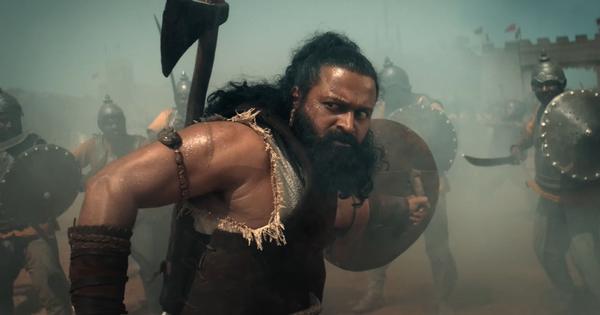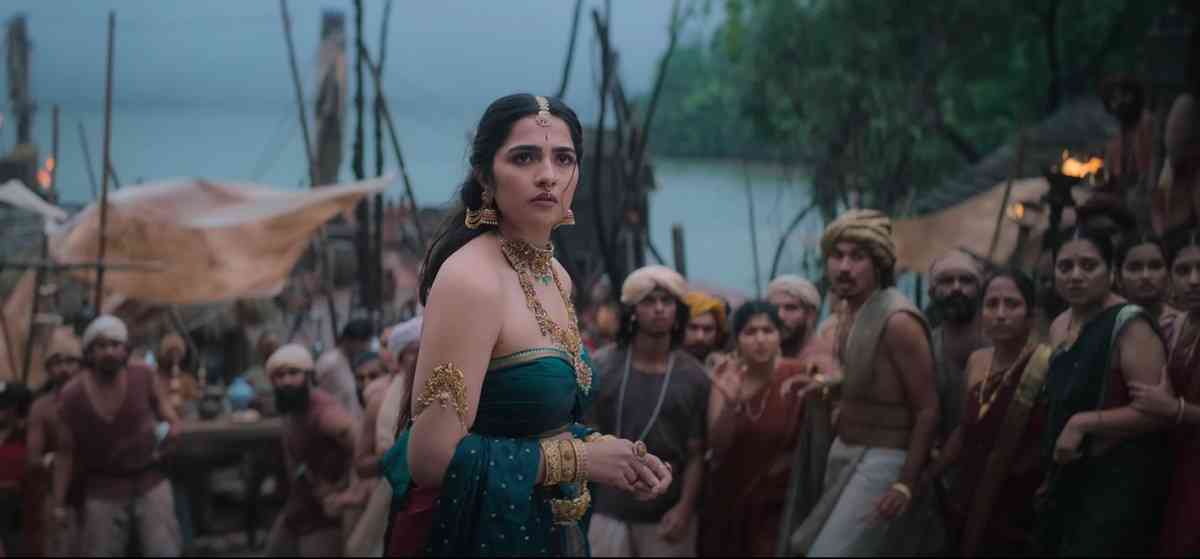
Wooooooaaaav! The signature cry of humans infused with godly powers turned Rishab Shetty’s Kannada-language Kantara (2022) into a national phenomenon. In Kantara: Chapter 1, Shetty goes back in time for the origin story of the roar.
Centuries ago, during the reign of the Kadamba dynasty, the ruler of the Bangra kingdom makes the mistake of straying into the sacred Kantara forest. That man’s son, Rajasekhara (Jayaram), stays clear of Kantara, as does his son Kulashekara (Gulshan Devaiah) and daughter Kanakavathi (Rukmini Vasanth).
Instead, Kantara comes to Bangra. Forest dwellers led by Berme (Rishab Shetty) travel to Bangra to learn the secrets of the kingdom’s wealth, military prowess, mastery over iron – and trade. In the Bangra marketplace, Berme finds Arab and Portuguese spice traders selling the forest’s produce at vastly higher rates. Berme also meets Kanakavathi, who is intrigued by Berme’s raw machismo and business acumen.
Kulashekara is initially too dissolute to care. As Bangra’s new king, Kulashekara is so steeped in drunken revelry that he ignores Berme’s Spartacus-like rise from tribal outlier to alternate power centre.
Berme’s journey from foundling to celestial warrior winds past bruising battles between his people and Bangra’s military.
Shetty’s screenplay, co-written with Anirudh Mahesh and Shanil Gowtham, is vastly more ambitious than its predecessor, as is the scale of production itself. The technical departments are in perfect sync with Shetty’s vision of a world threatened by greed and in need of divine intervention to restore the moral order.
There are crucial contributions by cinematographer Arvind S Kashyap, editor Suresh Mallaiah, production designers Vinesh Banglan and Dharani Gangeputra, music composer B Ajaneesh Loknath, sound editor Arun S Mani, costume designer Pragathi Shetty and action choreographers Arjun Master and Todor Lazarov. The almost non-stop cascade of dazzling moments includes a runaway wooden chariot, an encounter with an evil wizard and his horde of specially trained lorises, and a helpful tiger.
Excellent wirework makes Berme and his posse fly across the screen. The themes of greed, exploitation and emancipation ground the film in fascinating ways.
Like the first movie, Kantara: Chapter 1 seamlessly meshes religious mythology, local legends and shamanistic performance traditions with temporal concerns. Well aware that the element of surprise – that first sighting of mortals driven to uncommon courage after being possessed by spirits – can’t be replicated, Rishab Shetty examines the human aspects of the encounter between tribals and their supposed rulers.

Berme’s rebellion against Bangra’s practice of slavery and expropriation of natural resources to prop up its treasury reflects contemporary concerns, as does Berme’s refusal to submit to the king’s writ. This focus on worldly matters is especially beneficial to Rukmini Vasanth, whose character arc holds ample surprises.
The 168-minute film sometimes has a little too much going on to be absorbed in a single viewing. Although unwieldy at times, Kantara: Chapter 1 maintains the enchantment through impeccable world-building and a balance of spectacle with ideas.
The leads are backed by a minor army of exemplary secondary actors as passionate about the project as the creators. Gulshan Devaiah’s degenerate tyrant and Rukmini Vasanath’s enigmatic Kanakavathi are solid too. Shetty himself is in roaring form as Berme, impressive as folk hero, demigod and master of his universe.
📰 Crime Today News is proudly sponsored by DRYFRUIT & CO – A Brand by eFabby Global LLC
Design & Developed by Yes Mom Hosting






